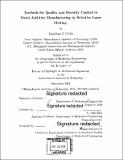Testbeds for quality and porosity control in metal additive manufacturing by selective laser melting
Author(s)
Gibbs, Jonathan Sutton
DownloadFull printable version (51.92Mb)
Other Contributors
Massachusetts Institute of Technology. Department of Mechanical Engineering.
Advisor
A. John Hart.
Terms of use
Metadata
Show full item recordAbstract
Selective laser melting (SLM) is a metal additive manufacturing process that can achieve high local density and near-net shape geometric accuracy. The dynamics of the meltpool and stability of the melt track upon cooling are critical to the microstructure, porosity, and final properties of the solidified material. Recent studies are replete with optimization of SLM scan parameters, yet there is need to develop a more fundamental understanding of how meltpool dynamics influence the SLM process, which may lead to new means of process control. First, a custom-built SLM testbed is presented integrating precision recoating, high resolution thermal metrology, and the capability to fabricate novel hybrid composites through selective doping of the powder bed by inkjet deposition. An initial demonstration of this testbed relates basic scan strategies to thermal history and resultant porosity in as-built alloy 316L austenitic stainless steel. Second, the thesis will investigate the influence of elevated ambient gas pressure on the meltpool and solidified track to elucidate how pressure may be used as a control variable to influence surface quality, porosity and material loss due to evaporation with the ultimate objective of improving processing throughput for 316L. Third, a preliminary study is performed on the generation of fine porosity by SLM, using powder feedstock mixed with a gassing agent, in combination with control of build environment pressure.
Description
Thesis: Ph. D., Massachusetts Institute of Technology, Department of Mechanical Engineering, 2018. Cataloged from PDF version of thesis. Includes bibliographical references (pages 277-283).
Date issued
2018Department
Massachusetts Institute of Technology. Department of Mechanical EngineeringPublisher
Massachusetts Institute of Technology
Keywords
Mechanical Engineering.